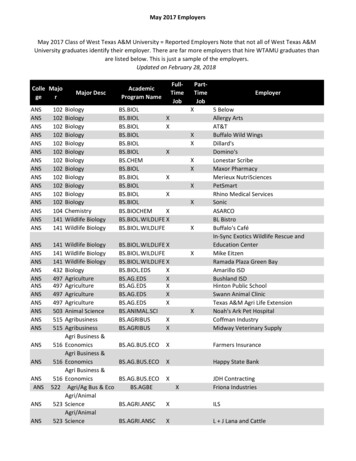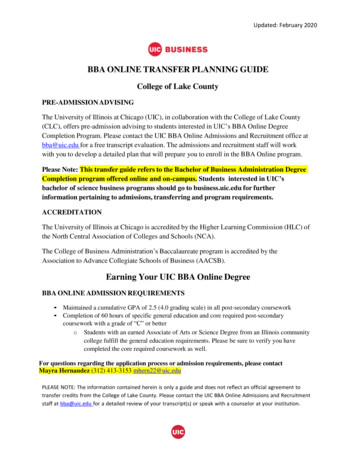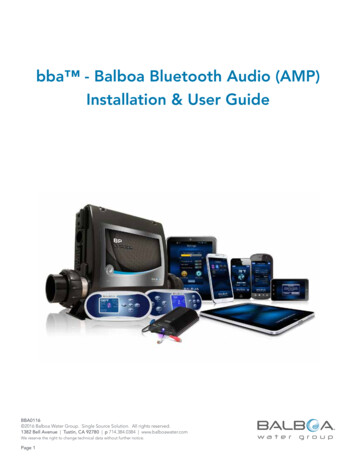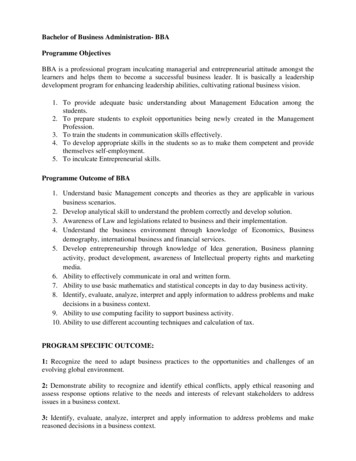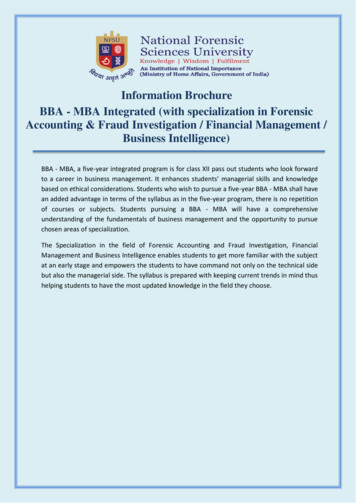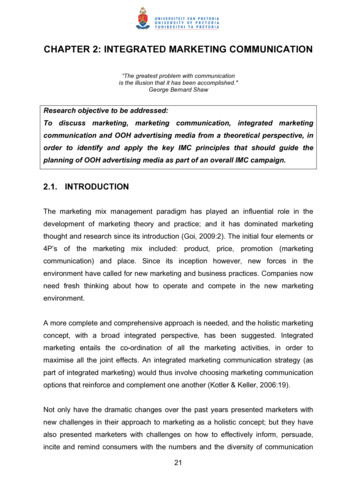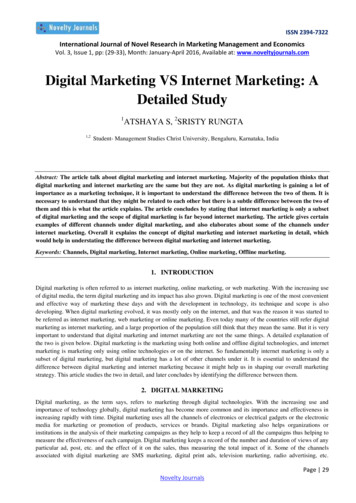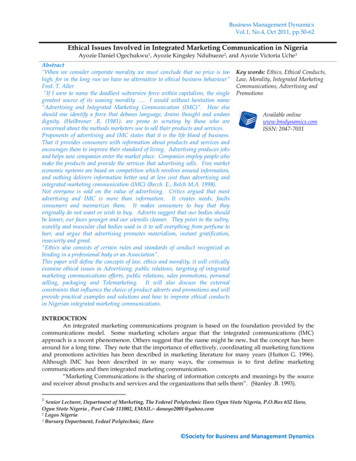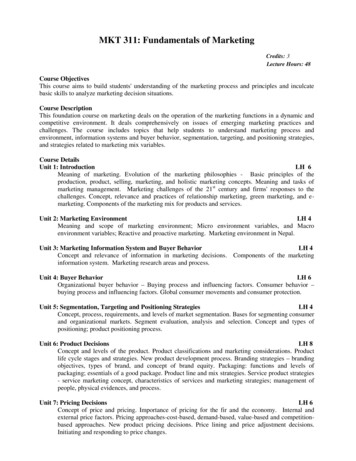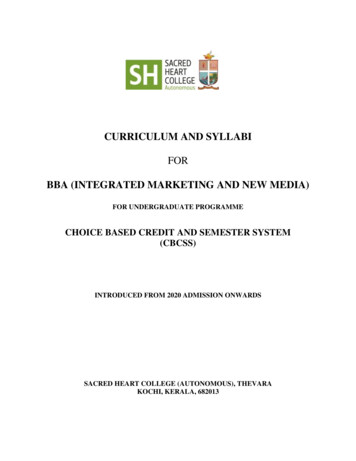
Transcription
CURRICULUM AND SYLLABIFORBBA (INTEGRATED MARKETING AND NEW MEDIA)FOR UNDERGRADUATE PROGRAMMECHOICE BASED CREDIT AND SEMESTER SYSTEM(CBCSS)INTRODUCED FROM 2020 ADMISSION ONWARDSSACRED HEART COLLEGE (AUTONOMOUS), THEVARAKOCHI, KERALA, 682013
1
CURRICULUM AND SYLLABIFORBBA (INTEGRATED MARKETING AND NEW MEDIA)FOR UNDERGRADUATE PROGRAMMECHOICE BASED CREDIT AND SEMESTER SYSTEM(CBCSS)INTRODUCED FROM 2020 ADMISSION ONWARDSSACRED HEART COLLEGE (AUTONOMOUS), THEVARAKOCHI, KERALA, 6820132
3
BOARD OF STUDIES IN MANAGEMENTSacred Heart College, Thevara, Kochi, KeralaMembers of the Board of Studies:1. Dr. Jayaseelan GM, Chairman2. Prof. Dr. Mathews P.J. XLRI (Retd. Faculty), Academician3. Dr. Aravind T. S. – Academician (Digital Marketing)4. Dr. Krishnakumar, Management Consultant5. Rev. Fr. Limson Antony CMI – Faculty Member, Programme Coordinator6. Ms. Kalpita Chakraborty - Faculty Member, Head of the Department7. Ebin Jose, Representative from industry, corporate – sector or allied area andfaculty members.4
5
S.NO.CONTENTSPAGE NO.1Preface32Programme Objectives and Outcomes43Regulations for Choice Based Credit and Semester System (CBCSS)54Course matrix185Syllabus276
7
1. BBA (INTEGRATED MARKETING AND NEW MEDIA)1. PrefaceThe program is designed to introduce students to the field of Integrated Marketing Communicationsand to help you make better marketing communications decisions. The program will define the meaning ofIntegrated Marketing Communication, and will run through the marketing process and will elaborate on theimportant decisions that marketing managers need to take through the marketing process. Communicatingwith the consumers, learning how advertising works, and how consumers make decisions, establishingmarketing communications budgets and elements of the marketing communication mix. This program willhelp in building the knowledge and skills required to ensure a strong marketing communications plan. BBAprogram in general consists of business-related courses and the BBA in Integrated Marketing and NewMedia specialises in Media and Communications.The aim of BBA – Integrated Marketing and New Media is to prepare graduates with the knowledgethey need to create and execute marketing strategies using a variety of channels and tactics. The studentswill learn how to measure the effectiveness of marketing campaigns with regard to brand awareness,company revenue, and other key metrics.Digital Marketing course will enable the students to understand the core components of DigitalMarketing and also explores the various aspects of the digital marketing environment. It provides anunderstanding of the foundations of the Digital Marketing landscape and helps students acquire a new setof concepts and tools to help create products and services. The rise of Digital Marketing has led to aparadigm shift in the marketing communication space, while also creating new opportunities for businessesto reach and engage consumers through digital technology.The program covers topics like Advertising Management, Market Research, Public Relations, SocialMedia Marketing, Consumer Behaviour and more. This BBA in Integrated Marketing and New Media willapproach marketing from a holistic and operational perspective.1. Rationale for the programWith the rapid evolution of new technologies and an increasingly sophisticated consumer population,it is crucial for companies and organizations to reach customers in new and innovative ways in order togain a competitive edge. Jobs are growing in the field of marketing because social media and new interactivemethods of communicating with customers are demanding fresh ideas and new approaches. Competition ishigh for managerial positions in this field, and earning a management degree is one way to help one’sresume stand out with recruiters and prospective employers.8
Programme Objectives and Outcomes1. To build the essential knowledge on marketing communications necessary to run sociallyresponsible business organisations.2. To provide the managerial framework for integrated marketing and new media communicationsand diverse tools used by marketers to apprise consumers.3. To build skills that are important to a company management and marketing profession, such ascognitive, technological, artistic and interpersonal skills.4. To provide students a comprehensive overview of various practical application aspects ofintegrated marketing and new media, including understanding different types of markets,competition, buyer behavior and communication.5. Improve the ability to think analytically and objectively among students studying integratedmarketing communication, digital marketing and new media principles and thus train them for afuture in marketing, advertisement and other compelling fields.6. To help students transition into the workforce and there by improve their financial independenceas well as their contribution to the economic and national development.7. To assist students develop Entrepreneurial skills that serve the needs of the society at large.Programme OutcomesAfter completion of the BBA in Integrated Marketing Communication and New Media program, thestudents will be able to:1. Apply the knowledge of management principles and practices to solve business problems.2. Appraise comprehensive learning and understanding of new-age media when it comes to marketingand branding strategies, technologies, approaches, products and services3. Acquire cognitive, technical and interpersonal expertise to execute effective communicationstrategies and business decisions effectively in a challenging business environment.4. Design effective media tools and techniques for creating awareness, customer engagement andbrand promotions5. Develop innovative ideas, marketing communication strategies for brand visibility and appeal6. Use appropriate research tools to identify problems and communication gap and conduct thoroughquantitative and qualitative studies for evidence-based marketing solutions7. Communicate effectively through contemporary media platforms, advanced software applicationsand acquire minimal skills to communicate in atleast one forign language.8. Explore the application of various media communication strategies in business, economy andsociety9. Ability to understand, analyse and apply appropriate accounting and statistical tools and methodsto manage and interpret business information.9
1. Regulations for Choice Based Credit And Semester System (Cbcss) For Under GraduateProgrammes -2019PreambleSacred Heart College, Thevara became an autonomous college under Mahatma University Kottayam in2014. The college revised the choice based credit and semester system (CBCSS) for undergraduateprogrammes in 2015-16. The Academic Council which met on 21-07-2018 approved the proposals of thevarious Boards of Studies for revising the syllabi of the undergraduate programmes from 2019-20admissions onwards and the regulations for CBCSS. The revised regulations are as follows3.1 TitleThese regulations shall be called “SACRED HEART COLLEGE THEVARA REGULATIONS FORCREDIT AND SEMESTER SYSTEM 2019”3.2 ScopeApplicable to all programmes of the college with effect from 2019 admissions, except otherwise approvedby the Academic Council of the College3.3 Definitionsi. ‘Programme’ means the entire course of study and examinations.ii. ‘Duration of Programme’ means the period of time required for the conduct of the programme. Theduration of undergraduate programmes shall be 6 semesters, the post-graduate programme shall be of 4semesters and M Phil programmes shall be 2 semesters.iii. ‘Semester’ means a term consisting of a minimum of 90 working days, inclusive of examination,distributed over a minimum of 18 weeks of 5 working days, each with 5 contact hours of one-hour durationiv. ‘Course’ means a segment of subject matter to be covered in a semester. Each Course is to be designedvariously under lectures / tutorials / laboratory or fieldwork / study tour /seminar / project / practical training/ assignments/evaluation etc. to meet effective teaching and learning needs.v. ‘Common Course I’ means a course that comes under the category of courses for English and ‘CommonCourse II’ means additional language, a selection of both is compulsory for all students undergoingundergraduate programmes(Model I)vi. ‘Core course’ means a course in the subject of specialization within a degree programme.vii. ‘Complementary Course’ means a course which would enrich the study of core courses.viii. ‘Open course’ means a course outside the field of his/her specialization, which can be opted by astudent.ix. ‘Additional core course’ means a compulsory course for all undergraduate students (as per the UGCdirective) to enrich their general awareness.10
x. The U.G. programmes shall include (a) Common courses (b) Core courses (c) Complementary Courses(d) Open Course (e) Study tour and (f) Internship for selected programmes.xi. ‘Additional Course’ is a course registered by a student over and above the minimum required courses.xii. ‘Credit’ (Cr) of a course is the numerical value assigned to a course according to the relative importanceof the content of the syllabus of the programme.xiii. ‘Extra credits’ are additional credits awarded to a student over and above the minimum creditsrequired for a programme for achievements in co-curricular activities carried out outside the regular classhours OR curricular activities/courses completed for value addition, as directed by the College/ department.It is the numerical value assigned to Club activities, Social service, Internship, etc. which is not added withthe total academic credits of the students. Additional credit components Talent & career club activity (optional)Social service (mandatory)Internship for BBA, Commerce, Communication and Computer applications (mandatory).Internship (desirable for other programmes).Add on courses (optional)xiv. ‘Programme Credit’ means the total credits of the UG Programme.xv. ‘Programme Elective course’ Programme Elective course means a course, which can be chosen froma list of electives and a minimum number of courses is required to complete the programme.xvi. ‘Programme Project’ Programme Project means a regular project work with stated credits on whichthe student undergoes a project under the supervision of a teacher in the parent department / any appropriateInstitute in order to submit a dissertation on the project work as specified.xvii. ‘Internship’ is on-the-job training for professional careers.xviii. ‘Plagiarism’ Plagiarism is the unreferenced use of other authors’ material in dissertations and is aserious academic offense.xix. ‘Tutorial’ Tutorial means a class to provide an opportunity to interact with students at their individuallevel to identify the strengths and weaknesses of individual students.xx. ‘Seminar‘ seminar means a lecture by a student expected to train the student in self-study, collectionof relevant matter from the books and Internet resources, editing, document writing, typing, andpresentation.xxi. ‘Evaluation’ means every course shall be evaluated by 25% continuous (internal) assessment and 75%end course/end semester (external) assessment.xxii. ‘Repeat course’ is a course that is repeated by a student for having failed in that course in an earlierregistration.xxiii. ‘Audit Course’ is a course for which no credits are awarded.11
xxiv. ‘Department’ means any teaching Department offering a course of study approved by the college /Institute as per the Act or Statute of the University.xxv. ‘Parent Department’ means the Department which offers a particular UG/PG programme.xxvi. ‘Department Council’ means the body of all teachers of a Department in a College.xxvii. ‘Faculty Advisor’ is a teacher nominated by a Department Council to coordinate the continuousevaluation and other academic activities undertaken in the Department.xxviii. ‘College Co-ordinator’ means a teacher from the college nominated by the College Council tolook into the matters relating to CBCS-PG System.xxix. ‘Letter Grade’ or simply ‘Grade’ in a course is a letter symbol (O, A, B, C, D, etc.) which indicatesthe broad level of performance of a student in a course.xxx. Each letter grade is assigned a ‘Grade point’ (GP) which is an integer indicating the numericalequivalent of the broad level of performance of a student in a course.xxxi. ‘Credit point’ (CP) of a course is the value obtained by multiplying the grade point (GP) by theCredit (Cr) of the course CP GP x Cr.xxxii. ‘Semester Grade point average’ (SGPA) is the value obtained by dividing the sum of credit points(CP) obtained by a student in the various courses taken in a semester by the total number of credits takenby him/her in that semester. The grade points shall be rounded off to two decimal places. SGPA determinesthe overall performance of a student at the end of a semester.xxxiii. ‘Cumulative Grade point average’ (CGPA) is the value obtained by dividing the sum of creditpoints in all the courses taken by the student for the entire programme by the total number of credits andshall be rounded off to two decimal places.xxxiv. ‘Grace Marks’ means marks awarded to course/s, as per the orders issued by the college from timeto time, in recognition of meritorious achievements in NCC/NSS/Sports/Arts and cultural activities.3.4 AttendanceBeing a regular college, physical presence in regular activities, especially, classes and exams, is mandatoryfor the students. However, if a student secures 75% of attendance s/he is eligible to appear for the exams,provided there are no other impediments like disciplinary proceedings, malpractice records, etc.i. A maximum of 5 marks (5%) for a course is given for attendanceii. Absence: A student found absent for one hour in the forenoon or afternoon session is deprived of theattendance for the entire session as far as eligibility for the final exam is concerned.iii. The hour related calculation in a course is meant for awarding marks for the course concerned.iv. Late entry: A student is supposed to be in time in the class. Late arrival related treatment is left to thediscretion of the individual teacher. However, as a norm, a late-arriving student may be permitted to theclass, if it is not inconvenient or distraction to the class as such; though attendance MAY NOT BE GIVEN.12
Late arrival beyond 5 minutes is treated as ABSENCE; though the teacher may consider permitting thestudent to sit in the class.v. Leave: A student has to formally report his/her absence with reasons either in advance or immediatelyafter the absence of obtaining an approved leave. This applies to all sorts of leave – medical, on duty orother.vi. The student is supposed to report in prescribed format on the very next day of the absence; however, upto a week’s time is permitted. Afterward, leave applications will not be considered.vii. The student has to retain a copy/section of the approved leave form and produce the same as proof, incase there is any confusion regarding the leave sanctioning. In the absence of such proof, the claims willnot be entertained.viii. Duty Leave: A student representing the college in sports, arts, social service or academic matters, hasto get sanction from the class teacher concerned and submit the leave application form duly endorsed bythe teacher concerned & the class teacher and submit it to the faculty Dean (or Vice-Principal). The samewill be forwarded by the Dean/Vice Principal for attendance entry. SPORTS: The approval of theDepartment of Physical Education and the class teacher is required. The time limit for submissionmentioned above is applicable in the case of duty leave as well.ix. CONDONATION: a student may have the privilege of condonation of attendance shortage (up to amaximum of 10 days) on the basis of genuineness of the grounds of absence (medical reasons or collegeduty), duly recommended by the department. This is not a matter of right. It is a matter of privilege basedon the Principal’s discretion and the good conduct of the student on the campus. A student of the UGprogramme may have a maximum of two such opportunities and that of PG programmes only oneopportunity.x. RE-ADMISSION – a student whose attendance is inadequate will have to discontinue the studies. Suchstudents, whose conduct is good, maybe re-admitted with the approval of the governing council, on thebasis of recommendation from the department, and assurance from the student and the guardian regardinggood conduct and compliance in academic and discipline matters. For this, the prescribed re-admission feehas to be paid.As a condition for re-admission, the student should have cleared all academic arrears or should haveappeared for the exams in which he/she is having an arrear (if the results are not out), and should havefulfilled all academic assignments prescribed by the department for compensating for his lack of attendance.xi. UNAUTHORISED ABSENCE & REMOVAL FROM ROLLS: A student absent from the classescontinuously for 10 consequent days without intimation or permission, shall be removed from the rolls, andthe matter intimated to the student concerned. On the basis of the recommendation of the departmentconcerned, the re-admission process may be permitted by the Principal.3.5 Programme Registration13
i. A student shall be permitted to register for the programme at the time of admission.ii. A UG student who registered for the programme shall complete the same within a period of 12continuous semesters from the date of commencement of the programme.3.6 PromotionA student who registers for the end semester examination shall be promoted to the next semester. However,in extreme circumstances, a student having sufficient attendance who could not register for the end semesterexamination may be allowed to register notionally by the Principal with the recommendation of the Headof the department concerned and, by paying the prescribed fee.3.7 PROGRAMME STRUCTURE FOR BBA (Integrated Marketing and New Media)aProgramme Duration6 SemestersbMinimum credits required from common courses16cMinimum credits required from Core courses includingManagement Project83dMinimum credits required from Complementary courses18eMinimum credits required from Open course03fTotal Credits required for successful completion of the programme120gClub activity (desirable)01hSocial service ( mandatory)01iTwo Internship (mandatory)02jMinimum attendance required75%3.8 ExaminationsAll the End Semester Examinations of the college will be conducted by the Controller of Examination. ThePrincipal will be the Chief Controller of Examinations. An examination committee consists of the ChiefController of Examinations, Controller of Examinations, Additional Chief Superintendent, Deans, IQACCoordinator and other faculty members nominated by the Principal will act as an advisory body of thematters relating to the conduct of examinations.3.9 Evaluation and GradingThe evaluation scheme for each course shall contain two parts;Continuous Internal Evaluation (CIA) andEnd Semester Examination (ESE).14
The internal to external assessment ratio shall be 2:3 for all core and complementary courses, for commoncourses and open course the ratio shall be 1:3. Both internal and external evaluation shall be carried out inthe marking system and the marks are to be rounded to the nearest integer.a. Continuous Internal Assessment (CIA)/ Continuous Assessment: The internal evaluation shall be basedon predetermined transparent system involving periodic written tests, assignments, seminars/viva/fieldsurvey and attendance in respect of theory courses and based on written tests, lab skill/records/viva andattendance in respect of practical courses. The marks assigned to various components for internal evaluationare as follows.Components of Internal Evaluation (for Core and Complementary courses)ComponentsMarksi.Quiz / Seminar / Presentations / Industry visit10iiAssignment5iiiAttendance5ivExperiential learning* / project10vTwo Test papers(2x5)10Total40i. Assignments: Every student shall submit one assignment as an internal component for every on1Reference/Review1Total5ii. Seminar: The seminar lecture is expected to train the student in self-study, collection of relevant matterfrom the books and Internet resources, editing, document writing, typing, and presentation.iii. Evaluation of AttendanceThe attendance of students for each course shall be another component of internal assessment.15
% of attendanceMarkAbove 90%5Between 85 and below904Between 80 and below853Between 76 and below802Between 75 and below761iv. Class Tests: Every student shall undergo two class tests as an internal component for every course.b. End Semester Examination (ESE): The End Semester Examination in theory courses shall be conductedby the college with question papers set by external experts/ question bank. The evaluation of the answerscripts shall be done by the examiners based on a well-defined scheme of evaluation given by the questionpaper setters/Prepared as per the direction of the Chairman, Board of Examiners. The evaluation of the EndSemester Examinations shall be done immediately after the examination preferably through the centralisedvaluation.c. ProjectProject work is a part of the syllabus of most of the programmes offered by the college. The guidelines fordoing projects are as follows:i. Project work shall be completed by working outside the regular teaching hours.ii. Project work shall be carried out under the supervision of a teacher in the concerned department or anexternal supervisor.iii. A candidate may, however, in certain cases be permitted to work on the project in an industrial / ResearchOrganization/ Institute on the recommendation of the Supervisor.iv. There should be an internal assessment and external assessment for the project work in the ratio 1:3v. The external evaluation of the project work consists of the valuation of the dissertation (project report)followed by the presentation of the work and viva voce.vi. The mark and credit with the grade awarded for the program project should be entered in the grade cardissued by the college.16
Components of Internal Evaluation for ProjectsComponentsMarksTopic/Area selected5Experimentation/Data tent10Presentation5Total40d. Comprehensive Viva-voceComprehensive Viva-voce shall be conducted at the end of the programme, which covers questions fromall courses in the programme as per the syllabus.e. Grade and Grade PointsFor all courses (theory & practical), Letter grades and grade point are given on a 10-point scale based onthe total percentage of marks, (CIA ESE) as given below:Percentage of Marks95 and aboveGradeOA Excellent85 to below 9575 to below 85A45 to below 55B109Very Good8Good7Above Average6Average5B 65 to below 7555 to below 65OutstandingGrade Point (GP)C40 to below 45DPass4Below 40FFail0Ab Absent017
Grades for the different semesters and overall programme are given based on the correspondingSGPA/CGPA as shown below:SGPA/CGPAGradeEqual to 9.5 and aboveO OutstandingEqual to 8.5 and below 9.5A ExcellentEqual to 7.5 and below 8.5A Very GoodEqual to 6.5 and below 7.5B GoodEqual to 5.5 and below 6.5B Above AverageEqual to 4.5 and below 5.5C AverageEqual to 4.0 and below 4.5D PassBelow 4.0F FailureA separate minimum of 30% marks each for internal and external (for both theory and practical)and an aggregate minimum of 40% are required for a pass for a UG programme. A candidate whohas not secured minimum marks/credits in internal examinations can re-do the same registeringalong with the end semester examination for the same semester, subsequently. A student who fails tosecure a minimum marks/grade for a ---pass in a course can be permitted to write the examinationalong with the next batch.After the successful completion of a semester, Semester Grade Point Average (SGPA) of a student inthat semester is calculated using the formula given below. For the successful completion of thesemester, a student should pass all courses and score at least the minimum CGPA grade ‘D’.However, a student is permitted to move to the next semester irrespective of her/his SGPA.Credit Point (CP) of a course is calculated using the formulaCP Cr x GP, where Cr Credit; GP Grade pointSemester Grade Point Average (SGPA) of a Semester is calculated using the formulaSGPA TCP/TCr, whereTCP Total Credit Point of that semester n1 CPi;TCr Total Credit of that semester n1 CriWhere n is the number of courses in that semesterCumulative Grade Point Average (CGPA) of a Programme is calculated using theformula (SGPA TCr) TCrCGPA SGPA / CGPA shall be rounded off to two decimal Places.18
To ensure transparency of the evaluation process, the internal assessment marks awarded to studentsin each course in a semester shall be published on the notice board/website at least one week beforethe commencement of the external examination. There shall not be any chance for improvement forinternal mark.The course teacher and the faculty advisor shall maintain the academic record of each studentregistered for the course which shall be forwarded to the controller of examinations through the Headof the Department and a copy should be kept in the department for at least two years for verification.3.10 Registration for the examinationa. All students admitted in a programme with remittance of prescribed fees are eligible for theforthcoming semester examinations.b. Online application for registration to the various End Semester Examinations shall be forwardedto the CE along with prescribed fee for each course in the prescribed format.c. The eligible candidates who secure the prescribed minimum attendance of the total duration of thecourse and possess other minimum qualifications prescribed in the regulations for each course shallbe issued the hall tickets. The hall ticket shall be downloaded by the students from the college website.d. The mode of fee remittance shall be through the prescribed bank.3.11 Supplementary ExaminationsCandidates who failed in an examination can write the supplementary examination conducted by theCollege along with regular examinations.3.12 Improvement of ExaminationA candidate can improve his/her marks once by appearing again for the examination with thesubsequent batch with the remittance of a prescribed fee. In such cases, the better of the two marksshall be taken as the marks awarded to him.Internal assessment marks shall be carried over to the subsequent semester examination.There shall not be any provision for improving internal assessment marks.3.13 Promotion to the Next Higher SemesterA candidate shall be eligible for promotion from one semester to the next higher semester if,a. He/she secures a minimum of 75 % attendance and registered for the End Semester Examinationof the programme for which he/she is studying.b. His / her progress of study and conduct are satisfactory during the semester completed, as per theassessments recorded by the course teachers and the Head of the Department concerned.19
3. 14 Certificates1. Degree certificates are issued by the Mahatma Gandhi University, Kottayam as per the act andstatues of the University on the submission of the consolidated mark/scorecards of the students bythe College.2. A consolidated mark / scored card shall be issued to the candidates after the publication of theresults of the final semester examination taken by the candidate.3. A Course Completion Certificate with classification shall be issued to students till the provisionalcertificate is issued by the university.3.15. Award of DegreeThe successful completion of all the courses with ‘D’ grade shall be the minimum requirement forthe award of the degree.3. 16. MonitoringThere shall be a Monitoring Committee constituted by the principal consisting of faculty advisors,HoD, a member from the teaching-learning evaluation committee (TLE) and the Deans to monitorthe internal evaluations conducted by the college. The Course teacher, Class teacher, and the Deansshould keep all the records of the internal evaluation, for at least a period of two years, forverification.Every Programme conducted under the Choice Based Credit System shall be monitored by theCollege Council under the guidance of IQAC Coordinator, Controller of Exams, academic deans andHoDs.3. 17. Grievance Redressal MechanismIn order to address the grievances of students regarding Continuous internal assessment (CIA), athree-level Grievance Redressal mechanism is envisaged. A student can approach the upper levelonly if the grievance is not addressed at the lower level.Level 1: At the level of the concerned course teacherLevel 2: At the level of a department committee consisting of the Head of the Department, acoordinator of internal assessment for each programme nominated by the HoD and the courseteacher concerned.Level 3: A committee with the Principal as Chairman, Dean of the Faculty concerned, HOD of thedepartment concerned and one member of the Academic council nominated by the principal everyyear as members.20
DETAILED DISTRIBUTION OF COURSESDetailed distribution of courses for Bachelor of Business Administration in Integrated Marketing and New MediaDuration of Course: 03 Years Full-time (06 Semesters)2. Course Matrix for BBASL. No.Common CoursesCredits1English I42Language I (French for Business Communication)43English II44Language II (French for Business Communication)4Total16SL. No.Complementary Courses (Media)Credits1Introduction to Photography32Journalism and Print Media33Multimedia34Television Production and Planning35Radio Production and Planning36Cinema Studies3Total1821
SL. No.Core CoursesCredits1Principles and Methodology of Management32Business Accounting33Business Statistics44Business Mathematics35Event Management36Busine
After completion of the BBA in Integrated Marketing Communication and New Media program, the students will be able to: 1. Apply the knowledge of management principles and practices to solve business problems. . of the content of the syllabus of the programme. xiii. 'Extra credits' are additional credits awarded to a student over and above .
